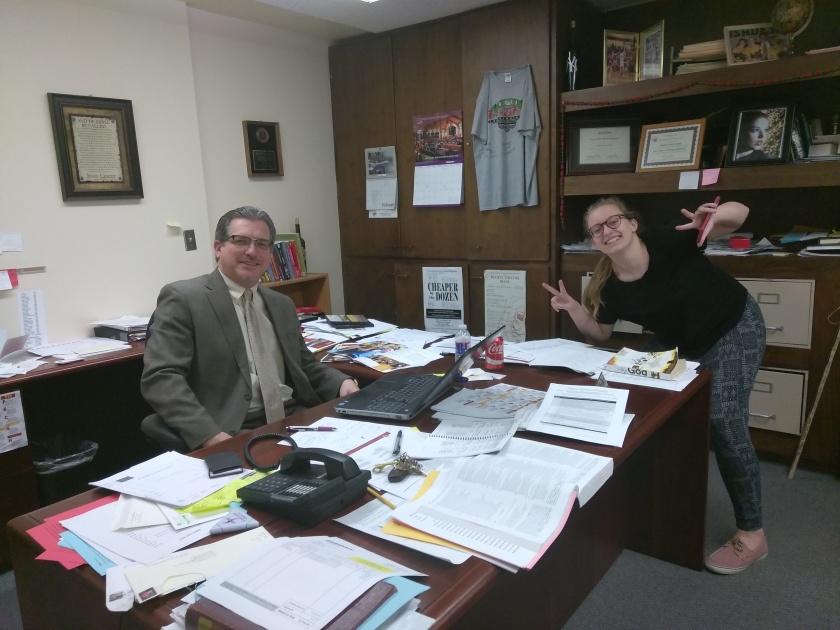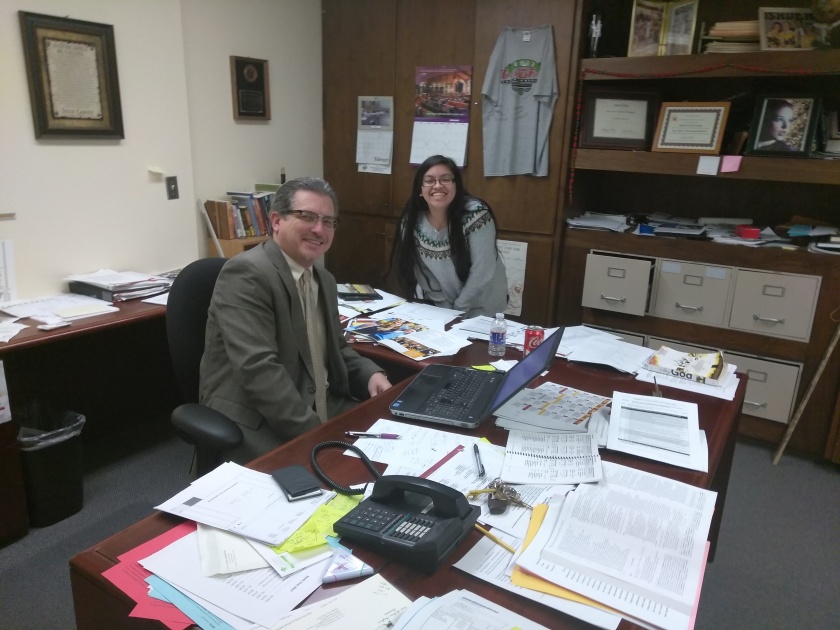Por/By: Ben, Jackie, y/and Mickie
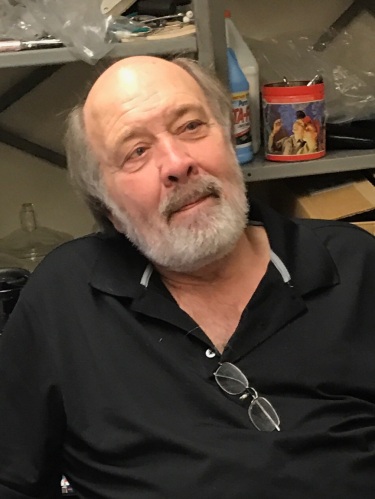
El reverendo, ex director y actual profesor de Anatomía en Lutheran High School, Kansas City, Missouri, señor Christopher Domsch, se sentó con la clase de Español-IV, para hablar de la evolución de la enseñanza en América, desde el inicio de su ilustre carrera hasta el presente. Con su figura de más de seis pies de alto, recibe el respeto de todos no solo por su longevidad, y su personalidad amable y amorosa. También es apreciado en gran manera por sus inmensos conocimientos de las ciencias y la educación. Una turbulenta cirugía casi cobra su vida recientemente; pero, gracias a Dios, él vive y continúa entre nosotros enseñando. Esta entrevista solo capturó un vistazo de su punto de vista con respecto al debate de larga data sobre la educación americana en el cambiante mundo moderno.
Pregunta: ¿Por qué escogió ser profesor?
Respuesta: La mayoría de las personas más influyentes en mi vida fueron educadoras. Ellas me enseñaron y reforzaron las cosas que aprendí de mis padres. Son importantes para mí, porque después que entendí lo que creían copié sus patrones.
P: ¿Cuándo se dio cuenta que quería enseñar?
R: Es una historia divertida. Comencé a enseñar a tiempo parcial en Messiah Lutheran School. Tenía que decidir si ir al ejército o enseñar. Fui a la entrevista de trabajo y me aceptaron, así que trabajé ahí la mitad de un año. Luego enseñé en Immanuel Lutheran School durante medio año solo la mitad del día, y la otra mitad, un año completo, en Messiah. Después fueron siete años en Immanuel. Entonces, ¿qué prefería? Quería hacer algo para ayudar a otras personas. Siempre he sido capaz de hacer dinero, el dinero nunca fue un problema para mí. El dinero nunca ha significado mucho para mí. Puedes ayudar a los niños a aprender, puedes verlos entender, y si no tienes que luchar demasiado contra ellos entonces tienes un buen ambiente de aprendizaje. De eso se trata.
P: ¿Cuánto tiempo lleva ejerciendo esta profesión?
R: 38 años.
P: ¿Y en LHS?
R: 27 años.
P: ¿Durante qué tiempo fue el director aquí?
R: 7 años.
P: ¿Prefiere ser profesor o director?
R: Prefiero ser profesor.
P: ¿Tiene una clase favorita?
R: Me gustan la Anatomía y la Fisiología.
P: ¿Qué trabajos ha tenido además de enseñar?
R: Tenía una compañía de carne y de construcción, y varias empresas de servicios de entrega. Siempre prefiero tener un negocio en lugar de trabajar para alguien.
P: ¿Prefiere enseñar en la escuela secundaria o en la escuela primaria?
R: Me gusta más la escuela secundaria, porque los estudiantes pueden razonar. Los niños de la escuela primaria están demasiado obsesionados con el estatus social, lo que hace difícil enseñar. Los estudiantes de secundaria tienen una meta en la mente y uno los ayuda a alcanzarla.
P: ¿En qué Universidad estudió?
R: Fui a Concordia Teachers College, en Seward, Nebraska, y obtuve mi maestría en Concordia University, Seward, Nebraska.
P: ¿Cómo eligió su carrera?
R: Cuando salí de Junior College pensé que iba a seguir una carrera en la iglesia. El consejero me había sugerido trabajar en el ministerio. Sabía mucho sobre él y habría sido buen ajuste para mí. Hablé con mis padres y oré mucho. Había una parte de mí que era demasiado rebelde para ser un predicador. Hubiera disfrutado de las cosas que los predicadores probablemente no deberían disfrutar. No me entiendan mal, no soy un monstruo. Hubiera sido un pastor salvaje, mas soy un maestro suave.
P: ¿Cambiaría alguna cosa en su vida?
R: Salí de educación porque tenía que conseguir un trabajo que pagara más dinero, y fue entonces que entré al negocio. Creí que no era justo que mi esposa y mis hijos sufrieran porque me parecía que esta ocupación era para mí. Es una vocación, pero al mismo tiempo no genera mucho dinero para dar comodidad a la familia. Así que hay un estremecimiento real cuando dices a alguien: “Te amo, vamos hacer una vida juntos”, y luego te dices a ti mismo: “¿Qué va a pasar cuando tengamos niños y yo sea la sentencia de esta familia, y no pueda ser más que esto”. En ese tiempo había muchas escuelas en Kansas City para obtener un trabajo en cualquier lugar, pero ninguna pagaba suficiente. Siempre iba a las juntas en donde trataban de convencerte que vivieras en dedicación. Así que finalmente salí y cuando hice bastante dinero para sustentar a mi familia, volví.
P: ¿Cúal fue su tiempo más memorable en la universidad?
R: En el verano cuando estaba allí trabajando en mi maestría, había una joven que tenía una reputación dudosa, más que dudosa, era muy fácil y quedó embarazada. Ella fue presa del pánico, porque pensaba que perdería cualquier posibilidad de continuar su educación. Luego estaba preocupada de que sus padres se enteraran, y lo natural que pasaría junto con eso. Ella me pidió que la llevará a Omaha para tener un aborto. Tomó tres semanas para hablar sobre esto, finalmente tuvo el bebé y no el aborto.
P: ¿Cuál es su opinión sobre el sistema de educación hoy vs. épocas anteriores?
R: Hoy, en general, es mucho menos desafiante que antes. Ahora hay más responsabilidad por parte de los profesores. Cuando estaba empezando en la escuela, los profesores entregaban hojas de ejercicios y decían: hazlo. No hacían nada, no enseñaban en clase. Cuando llegué al colegio, ellos realmente nos enseñaban nuestros cursos. Muchos de los métodos de nuestros cursos fueron establecidos por nuestros instructores. Decían: usted tome esta unidad, y usted tome esta otra. Uno debía recoger señales y pistas de otros compañeros. Yo estaba muy frustrado con eso. Cuando empecé a enseñar en el nivel primario, tenía unos niños muy brillantes. Voy a ser honesto: algunas de las cosas que estoy enseñando aquí en Biología, lo enseñaba en las clases de 7mo. y 8vo. La materia de Matemáticas no la enseño aquí, pero una vez enseñé Álgebra, y los niños de 7mo. y 8vo. estaban listos para entrar en Álgebra 2 cuando se graduaron. Fue un reto muy temprano. Los que fueron a otras escuelas pasaron un año muy fácil. Yo escuchaba de nuestros graduados en la universidad, cuyo primer año era básicamente un paseo, todos estaban felices. Yo me decía a mí mismo: están perdiendo un año completo de educación, porque lo que les están impartiendo ya lo aprendieron. El colegio no debería remediar la high school, y la high school no debería compensar la escuela elemental, que finalmente se traducirá en las escuelas privadas.
En el norte de Kansas City, ahora en lugar de enseñar a los niños a leer, los enseñan casi todo en el reconocimiento de la vista, y cuando tienen reconocimiento de palabras por la vista, no saben cómo dividir una palabra. Entonces si nunca lo han visto, no funciona, solo pueden pronunciarla, pero no pueden definirla porque en sus mentes está todo desordenado. Es más, ellos mezclaron un poco de fonética y un poco de reconocimiento de texto, sistema con el que un maestro les lee un guión particular a los niños, por lo tanto si tú eres un estudiante de primer grado te digo: ‘esto es un gato’ y me repites ‘esto es un gato’, y te repito a ti otra vez y me repites, y de alguna forma ellos consideran que esto es suficiente para enseñar a las criaturas a leer y cómo descomponer oraciones y todo lo demás. Creo que es un experimento fatal.
Nosotros, los Estados Unidos, estamos en el 2017, en el mundo occidental, con nuestro sistema de educación. Vosotros sois afortunados que estáis en una escuela que demanda algo de ustedes, sería malo si fueran a sus casas todos los días sin ser desafiados a tener éxito. Los niños en otras escuelas… Mi hijo llevó a una chica que se graduó de una escuela de Kansas City con 4.0 GPA, a tomar un examen para ingresar al ejército. Este examen básicamente es de llenar espacios en blanco. Ella estaba nerviosa. Mi hijo le dijo: “No te preocupes, tú no puedes fallar”. Él tuvo que conducir de vuelta a la casa, y ella había fallado el examen. Un estudiante de 4.0 que no puede contestar preguntas simples, y ese es al que enviamos a las universidades. Mi suegro estuvo involucrado en el sistema de colegios comunitarios, cuando empezó y estaban buscando maneras de ampliar el plan de educación para que los estudiantes tuvieran más opciones de carreras y una buena base de dos años. Ahora el sistema de las universidades comunitarias metropolitanas en el área de KC, es un remedio. En las escuelas enseñan a los niños a leer en algunos casos, y matemáticas básicas.
Si esa es la dirección en la que se dirige nuestro proceso de educación tengo miedo a la muerte. Para la generación de ustedes no es tanto. Su generación todavía va a ser bastante competitiva. Pero un efecto dominó vendrá. Ustedes son muy afortunados, porque sus padres hablan bien, disfrutan de la educación y esperan algo, gastan suficiente dinero para ponerlos en un lugar donde reciben buena educación. Sin embargo, hay una gran cantidad de familias que abdican la responsabilidad de sus hijos en el minuto en que suben en el autobús escolar, y hay una gran cantidad de familias que tienen dos padres -no es que siempre sea negativo-, pero hay familias que no tienen la capacidad para asegurarse de que funcionan. Estos padres no siguen la educación, porque no es tan importante para ellos. Pero lo más importante para la familia, además de la fe cristiana, es que los hijos sean educados. Quiero que mis hijos puedan hacer lo que ellos quieren hacer.
P: ¿Cómo se reparará este daño?
R: Todavía hay algunos bastiones pequeños de educación. El problema primario con la educación hoy, son los padres y los maestros que quieren ser amigos. Si tienes un gran amigo que es un gran maestro, entonces eres muy afortunado, porque generalmente cuando tienes un gran amigo él no es un gran maestro, pues no demanda tanto de ti. El maestro joven es siempre más popular, es el que ofrece amistad, te gusta mucho lo que hace y demás. Necesitan un par de años para poner sus pies sobre la tierra como educadores. Desafortunadamente, esto es lo que pasa ahora, los educadores mayores están saliendo, los personas que están diciendo lo que es realmente importante, que exigimos algo de los estudiantes. Esta gente comienza a seguir su viaje y en algún mento llegaremos cuando ninguna demanda sea hecha. ¿Y luego qué será?
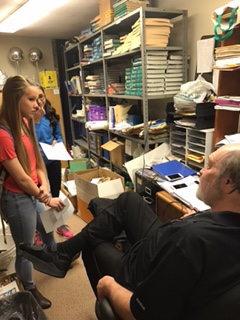
The revered former principal and current Anatomy teacher at Lutheran High School, Mr. Christopher Domsch, sat down with the Spanish 4 class and discussed the American education evolution from when he began his illustrious career to the present. With his figure over six feet tall, Mr. Domsch is respected by all not only for his longevity and his loving personality but also for his immense knowledge of science and education. Recently, a turbulent surgery nearly claimed his life, but by the grace of God Mr. Domsch lived and continues to teach. This interview captured only a brief glimpse into his view concerning the long-standing debate of American education in the ever-changing modern world.
Question: Why are you a teacher?
Answer: Some of the most influential people in my life were educators. They were people who taught me and reinforced the things my parents taught me. They were important because after I understood what they stood for, I was trying to emulate their habit patterns.
Q: When did you decide you were going to be a teacher?
A: It’s a funny story. The first time I started teaching there was a part time job available at Messiah and I had made up my mind I was either going into the armed service or teaching. So I just went into the job interview and they said come on, and so I went out there for half a year. Then I taught at Immanuel for half a day half a year and the other half the day for a full year at Messiah and then seven years at Immanuel. Do I have a preference here? I wanted to do something to help other people, I’ve always been able to make money; that was never the problem for me. The money has never meant anything to me. You can help kids learn if you can see the lights go on a classroom, and, if you don’t have to fight them too much, then you have a real good learning environment and that’s what it is all about.
How long have you been a teacher?
Answer: 38 years.
Q: How long have you been a teacher at LHS?
A: 27 years.
Q: How long were you the principal?
A: 7 years.
Q: Do you prefer being a teacher or a principal?
A: I prefer being a teacher.
Q: Do you have a favorite class to teach?
A: I like Anatomy and Physiology.
Q: What jobs have you had besides teaching?
A: I owned a meat and construction company and several delivery service companies. I always owned rather than worked for when I was outside of teaching.
Q: Where else have you taught?
A: I taught at Immanuel and Messiah. I have subbed at various other schools.
Q: Do you prefer teaching high school or elementary school?
A: I like high school because people can reason. Grade school kids are obsessed with social status which makes it difficult to get through to them. High school students have a goal in mind and you are helping them reach it, or they want to defy what’s going on and you can tolerate it.
Q: Where did you go to college?
A: I went to Concordia Teachers College in Seward, Nebraska and got my Masters at Concordia University Seward Nebraska.
Q: How did you choose your degree?
A: I knew at the point in time that I got out of Junior College that I was going to pursue a career in church work somewhere. The counselor suggested that I go into the ministry. I knew a lot about it, and so why don’t you, that would be a good fit for you. I talked it over with my folks and I prayed a lot. I don’t know, there was a part of me that was a little too rebellious to be a preacher. I would have enjoyed the kinds of things that preachers probably shouldn’t enjoy that much. Now don’t misunderstand, I’m not a freak. By the same token I would have been a wild kind of pastor, whereas I was just a mild kind of teacher.
Q: If you could, would you change anything?
A: I got out of education because I had to get a job that paid more money and that’s when I went into business for myself. I didn’t figure it was fair for my wife and children to suffer because I thought that this occupation was the occupation for me. It’s an advocation but by the same token there’s not a lot of monetary return to support a family comfortably when I first started teaching. I could have gotten food stamps, for example. So there’s a real stretch in when you say to somebody look I think I love you and we are gonna make a life together – you say to yourself what happens when we have children and I am gonna be the breadwinner and I can’t make any more than this doing this and there’s nowhere to go and at that point in time KC was littered with grade schools, comparatively, so you can get a job anywhere. But none of them paid enough and I was always going into meetings where they were trying to convince you you could live on dedication. I kept trying to barbeque education so that we would have people over at the house but that didn’t work. So eventually I got out and when I made enough money to support my habit I got back in.
Q: What was your most memorable time in college?
R: There was a young lady in the summer when I was up there working on my Masters degree who had had a dubious reputation, more than dubious. She was very easy and she became pregnant. She was panicking because she thought she would lose any chance of continuing her education, and was worried that her parents would find out, and the natural things I guess would go along with that. And she asked me to take her into Omaha to have an abortion, and I took three weeks to talk her through it. And she had the baby and she didn’t have it aborted.
Q: What is your opinion on the educational system today vs. then?
R: Much less challenging overall today. There is much more assumption of responsibility on the teachers’ part. When I was first starting at the school the teachers handed out worksheets and they said do it and that’s it. You didn’t do anything, you didn’t do any teaching in class. When I got to college we were actually teaching our courses.
A lot of our methods courses were set up by our instructors: they would say take this unit and you take the next one you take the next one and we were supposed to pick up cues and clues from people. And I was very frustrated with that. And I got out and began teaching at the grade school level, and we had some extremely bright kids. I’ll be perfectly honest: some of the stuff I’m teaching here in biology I taught in 7th and 8th grade biology when I first got out, and the math stuff – I don’t teach math here I did once upon a time – I taught Algebra but I had kids who were ready to go into Algebra 2 by the time they graduated 7th and 8th grade. So I feel it was very challenging early, and then I heard that people went into different schools and they could just pass through for a year. And I hear that from our graduates going to college, that basically their freshman year in college is just a layoff year and everybody’s just happy as a clam about that and I’m saying to myself you’re wasting a full year of your education because what you’re learning is what you’ve already learned and college shouldn’t remediate for high school, and High School shouldn’t remediate for grade school and I see more of that coming. I see it coming more in the public school, which eventually will translate into the private schools.
North Kansas City now, instead of teaching kids to read, giving them a breakdown capacity, is teaching almost everything on sight recognition. When you have word recognition that’s great but if you don’t know how to break a word down then, if you’ve never seen it, it doesn’t fit, it doesn’t work anymore. You cannot only pronounce it, you also don’t define it because your mind is all cluttered with what the heck this word happens to be and that’s it. You didn’t do anything, you didn’t do any teaching in class.
And they have changed from a kind of a part phonetic, part word recognition system to a system where the teacher reads a particular script to the kids. So if you’re first graders I would say “this is a cat” and you would repeat back to me “this is a cat”, and I would repeat it back to you and you would repeat it back to me and somehow they feel that this is going to be enough to teach kids in early childhood how to read and how to break down sentences and so forth. I think it’s an experiment that’s going to be very difficult to come out from under.
Right now we are 17thth in the world, in the Western world, with our educational process when people graduate from High School. You all are very fortunate; you’re in a school that demands something of you. And even then you aren’t challenged so bad that you go home every night worrying whether you’re ever gonna succeed. You know, the kids that have gone through other high schools… my son took a gal who graduated from a Kansas City high school who got a 4.0 GPA all the way through and she was going to take the test for the Armed Services. The Armed Services test is basically “are you warm, you know, and fill in the blank,” and he took her over there and she was nervous anyhow and he said “don’t worry about it you can’t fail this test”. He had to drive her back after, and she had failed it. Now, this is a 4.0 student who can’t answer simple questions and that’s what we are turning loose on the colleges. When my father-in-law was involved with the community college system, when he first started they were looking for ways to expand curriculum upwards so that kids would have more career choices and have a good two-year basis. Now most metropolitan community college systems in the Kansas City area are remedial. Teaching kids to read in some cases, and teaching them basic math.
If that’s the direction that our education process is headed I’m scared to death. For your generation not so much. Your generation is nonetheless going to be fairly competitive, but a ripple effect is happening and it will go downhill from there. Who knows what the product will soon look like… You guys are very fortunate because your parents speak well, they enjoy education and expect something of you and they bother to spend enough money to put you in a place where you will get that education that they want. There are an awful lot of families that abdicate responsibility for their kids the minute their kids get on the school bus. And, there are an awful lot of families that have two parents – not that that’s always a major negative – but there are families that do not have the capacity to make sure it works. And these parents do not pursue education because it is not as important to them The most important thing to my family besides Christian faith is our kids become educated. I want them to be able to do what they want to do.
Q: How can this damage be fixed?
A: There are some small bastions of education left. The primary problem with education today is that parents and teachers want to be buddies. If you have a great friend who is a teacher who is also a great teacher then you’re very fortunate because most of the time that you have a great friend they’re not as great a teacher because they won’t demand as much from you. And very young teachers coming out of school are always the most popular and they’re the ones you make the most friends with or are best friends with and you really like what they do and so forth. It takes them a couple years to get their feet on the ground as educators. And unfortunately that’s what’s happening now; the older educators are getting out and the people who are saying what’s really important – that we demand something out of you – are starting to move on and at some point we will get to a point where there is no demand made. And then what will it be like?
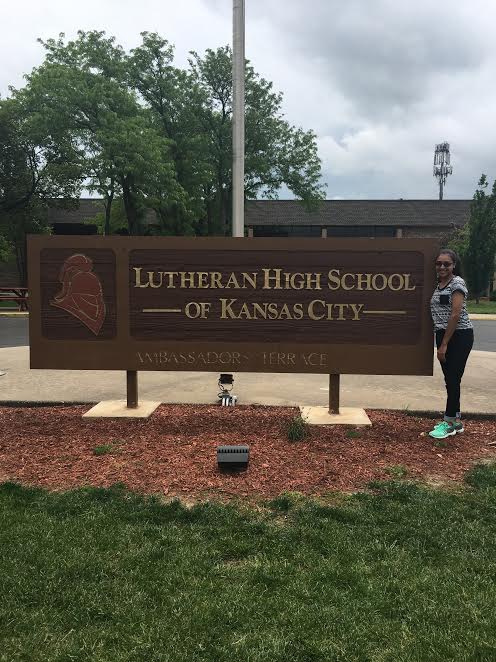


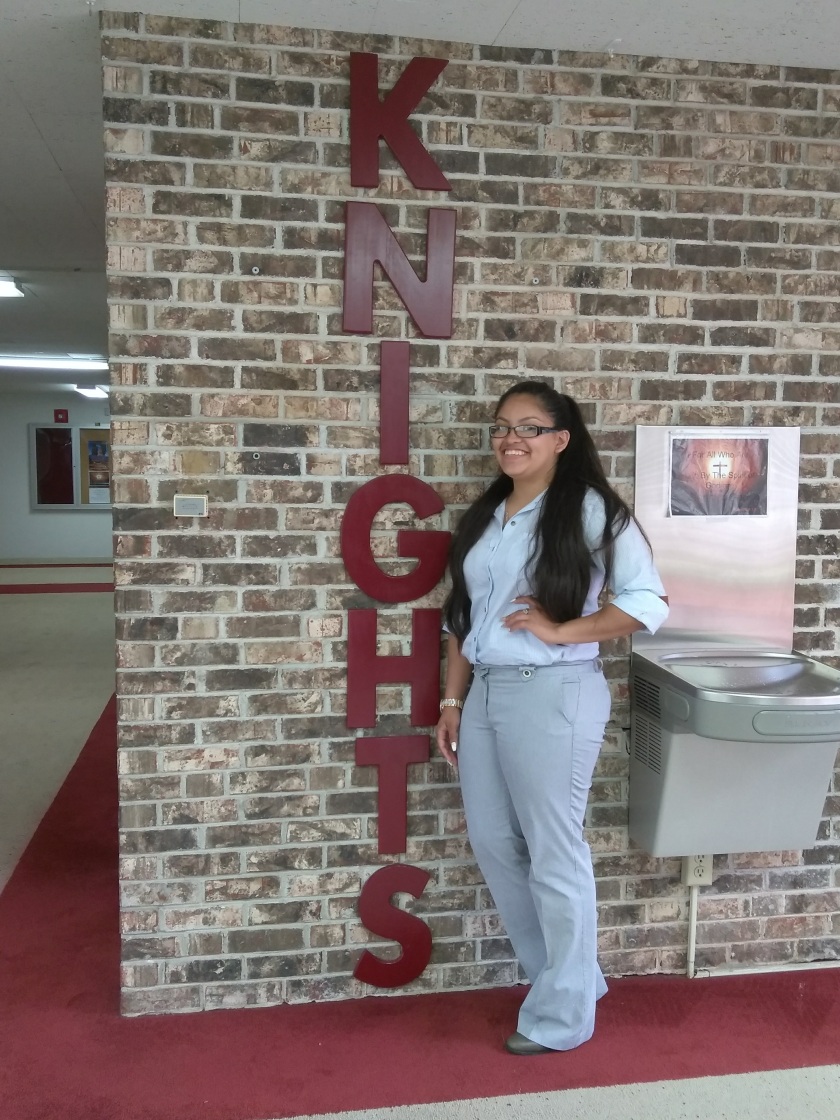
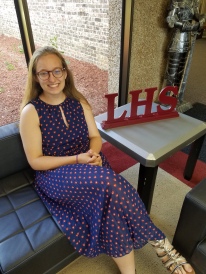
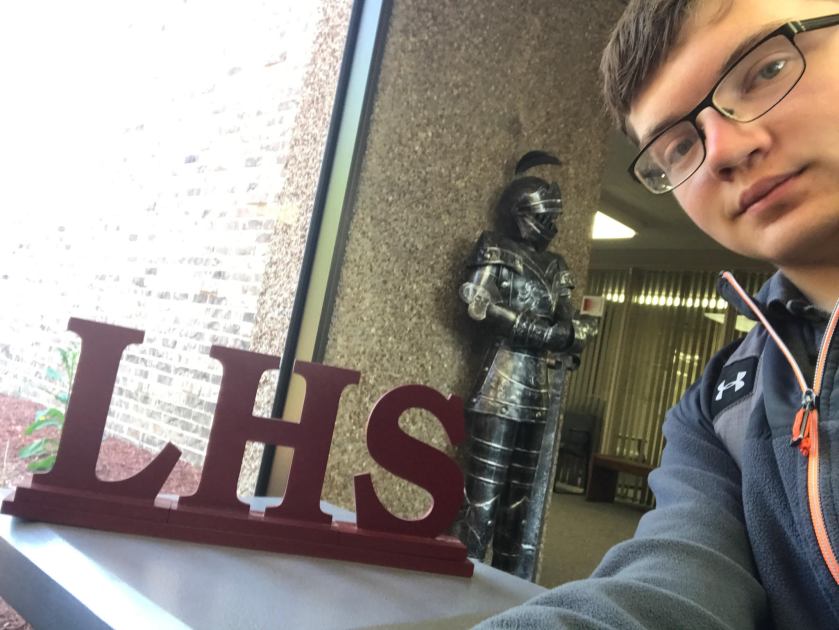
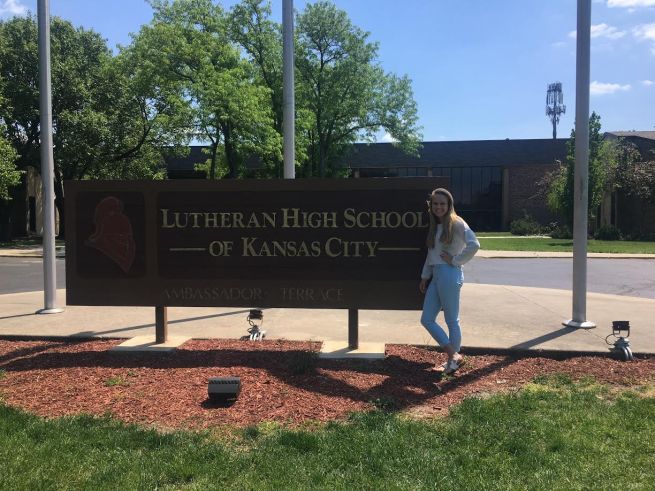
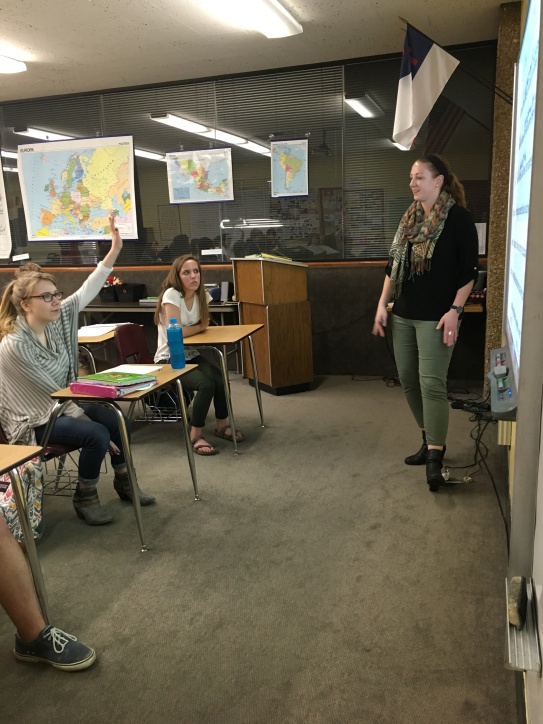
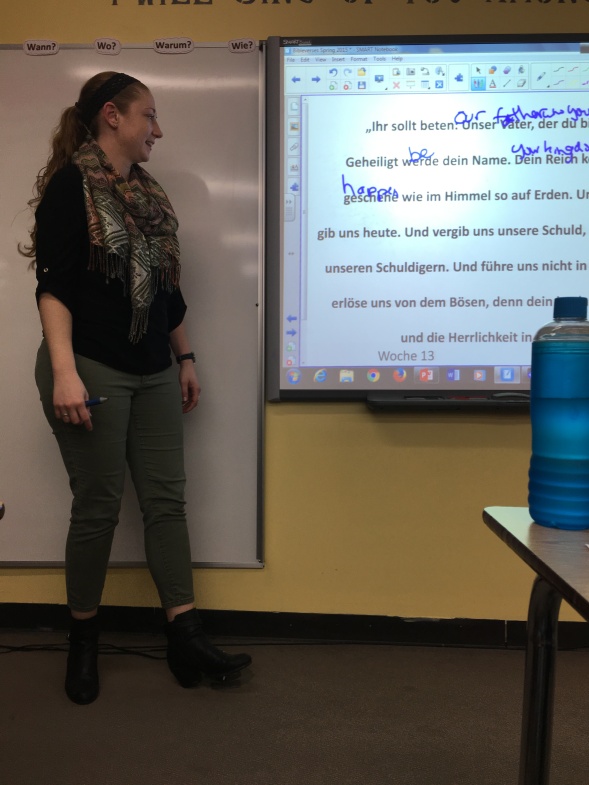
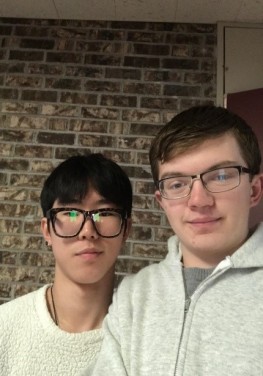 Mi papá dijo que era bueno para mí estudiar en los Estados Unidos, así que le dije que iría, y mi tía busco escuelas americanas y ella decidió. Solo la buscó.”
Mi papá dijo que era bueno para mí estudiar en los Estados Unidos, así que le dije que iría, y mi tía busco escuelas americanas y ella decidió. Solo la buscó.”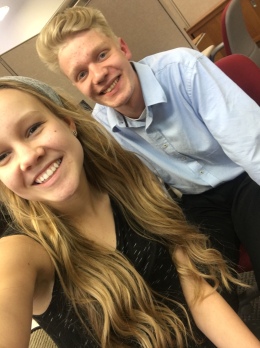 Buena pregunta. Me gusta que estemos juntos en Cristo y la gente.
Buena pregunta. Me gusta que estemos juntos en Cristo y la gente. 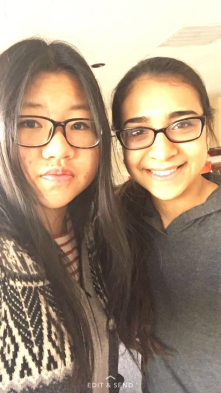 America, and I think LHS was the high school I wanted.”
America, and I think LHS was the high school I wanted.”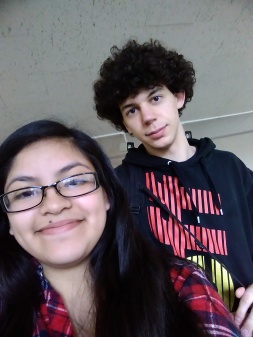 are the ones that move. Basically, in the teaching process, here you have a little more notes that they hand out and a little more connection between students and teachers. In my country they are a little more strict and pretend a little more. In doing that they don’t do a better job because they pretend more. Here it is actually easier to learn things than there, for me at least.”
are the ones that move. Basically, in the teaching process, here you have a little more notes that they hand out and a little more connection between students and teachers. In my country they are a little more strict and pretend a little more. In doing that they don’t do a better job because they pretend more. Here it is actually easier to learn things than there, for me at least.”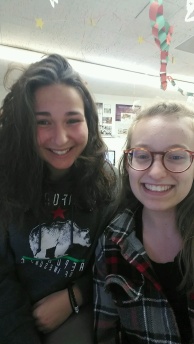 through my mind. We have a pretty good system and I have two years left of high school, and I think not graduating would be stupid and I’ve been in this program since I was three. I thought about going to college here, but the biggest thing is the price. It’s really expensive here, but in France it’s free.”
through my mind. We have a pretty good system and I have two years left of high school, and I think not graduating would be stupid and I’ve been in this program since I was three. I thought about going to college here, but the biggest thing is the price. It’s really expensive here, but in France it’s free.”

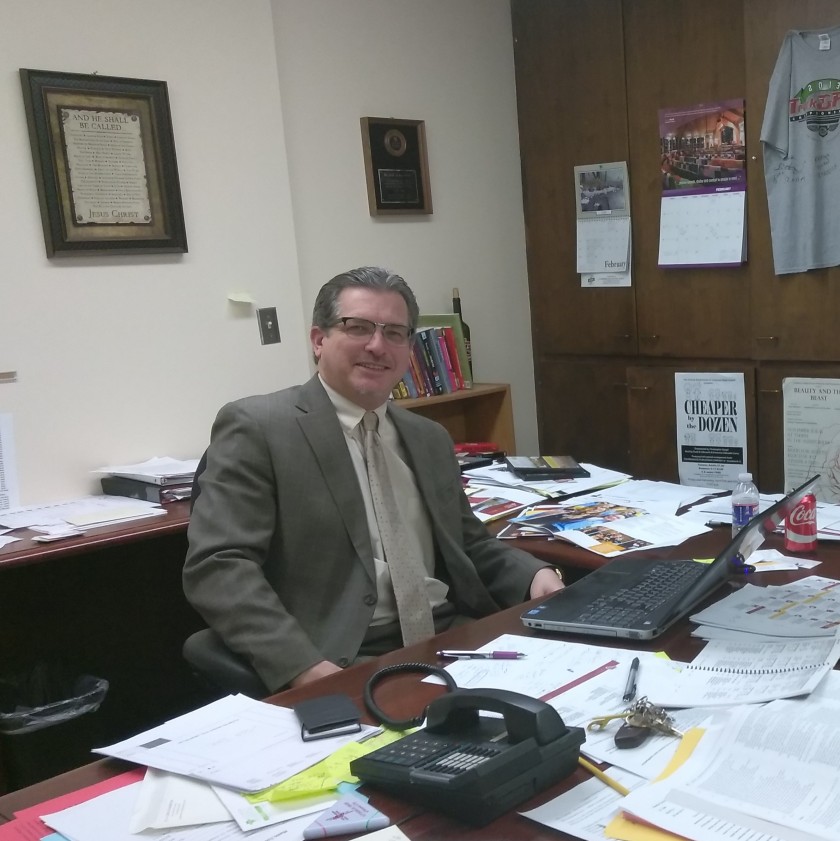 “…donde todos están en la misma página, 100% en la misma misión.” | “…where everyone is on the same page, 100% in the same mission.”
“…donde todos están en la misma página, 100% en la misma misión.” | “…where everyone is on the same page, 100% in the same mission.”